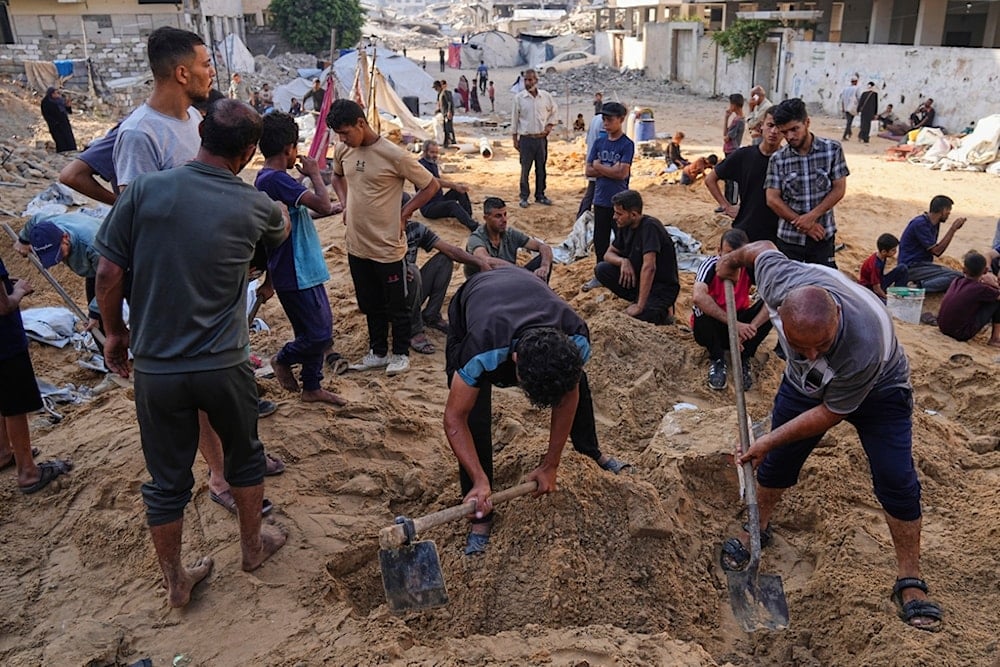UN: Gaza health system facing systematic, deliberate destruction
UN rapporteur Tlaleng Mofokeng says Gaza’s health system is under systematic attack by “Israel,” warning of genocide and failure of global accountability.
-

Palestinians dig through sand looking for belongings after an Israeli strike hit a displacement tent camp in Gaza City, Saturday, June 28, 2025 (AP)
The UN Special Rapporteur on the Right to Health, Tlaleng Mofokeng, has warned that the health system in the Gaza Strip is facing a “systematic and deliberate assault” by the Israeli occupation, as part of a broader campaign undermining the right to life and basic human dignity.
In an exclusive interview with Al Mayadeen, Mofokeng stated that “the right to life no longer exists in Gaza” and that “the chance of survival has become non-existent” amid the continuing aggression. She emphasized that she had repeatedly issued early warnings to the Israeli occupation regarding its obligations under international law but received no response.
Describing the humanitarian and medical conditions in Gaza as catastrophic, Mofokeng said they “do not allow for a dignified life or a society capable of survival or growth.” In addition to the direct injuries caused by relentless attacks, she highlighted the severe psychological toll on Gaza’s residents, who suffer from trauma, chronic stress, and sleep deprivation—conditions that further devastate their physical and mental well-being.
Targeting of aid agencies a 'deliberate policy'
Mofokeng condemned the Israeli occupation’s blockade and repeated attacks on UN and relief agencies, calling it part of a “broader plan to dismantle the human rights system and evade accountability.” The destruction of humanitarian infrastructure and the forced shutdown of aid agencies were not incidental, she stressed, but intentional, and facilitated by the political protection the Israeli regime receives from powerful countries, even within the UN system.
Commenting on the new US-"Israel"-backed distribution mechanism known as “Gaza Humanitarian,” Mofokeng dismissed it as “a new method of killing and part of a plan for genocide.” She explained that warnings were issued early on about the deprivation of food, water, and medicine, but they were ignored.
“People today are standing in random queues, under constant threat from snipers and assaults,” she added.
Global accountability in crisis
“If humanity truly learned from history, we wouldn’t be here,” Mofokeng stressed. She expressed deep frustration over the paralysis of the UN Security Council, the repeated use of vetoes, and the failure to enforce rulings by the International Court of Justice. “What is the use of accountability if the decisions are never implemented?” she asked.
The UN expert urged the international community to keep its eyes on Gaza and resist the distraction of other global crises. “The greatest challenge,” she said, “is not to forget.”
'Israel' admits to targeting civilians
Haaretz reported earlier in June that officers and soldiers in the Israeli army admitted receiving direct orders to open fire on Palestinians gathered near aid distribution centers.
According to the report, the soldiers acknowledged that the Palestinians they targeted were unarmed and posed no threat.
This comes as Gaza’s Health Ministry released its daily casualty toll, recording 72 martyrs and 174 wounded in the past 24 hours alone.
Many victims remain trapped under the rubble or in roads inaccessible to emergency and civil defense teams, due to the intensity of the ongoing Israeli bombardment.
Since the start of the war on October 7, 2023, the total number of Palestinian martyrs has reached 56,331, with 132,632 wounded. As of March 18, 2025, alone, Gaza has recorded 6,008 martyrs and 20,591 injuries.
Weaponization of food in Gaza constitutes war crime: UN
According to the UN and Gaza’s Health Ministry, 549 people have been killed and more than 4,066 have been injured while trying to access food aid as of June 25. With Gaza’s death toll surpassing 56,000, aid deliveries remain dangerously obstructed. The collapse of water systems now threatens widespread drought and famine.
The UN human rights office also warned on Tuesday that the weaponization of food distribution in Gaza could amount to a war crime. The statement comes amid growing international criticism of the new aid distribution model operated by the Israeli-backed Gaza Humanitarian Foundation (GHF).
Speaking at a press briefing in Geneva, UN human rights office spokesperson Thameen al-Kheetan described the current system as "Israel’s militarized humanitarian assistance mechanism," stressing its deadly consequences for civilians in desperate need of relief.

 4 Min Read
4 Min Read










